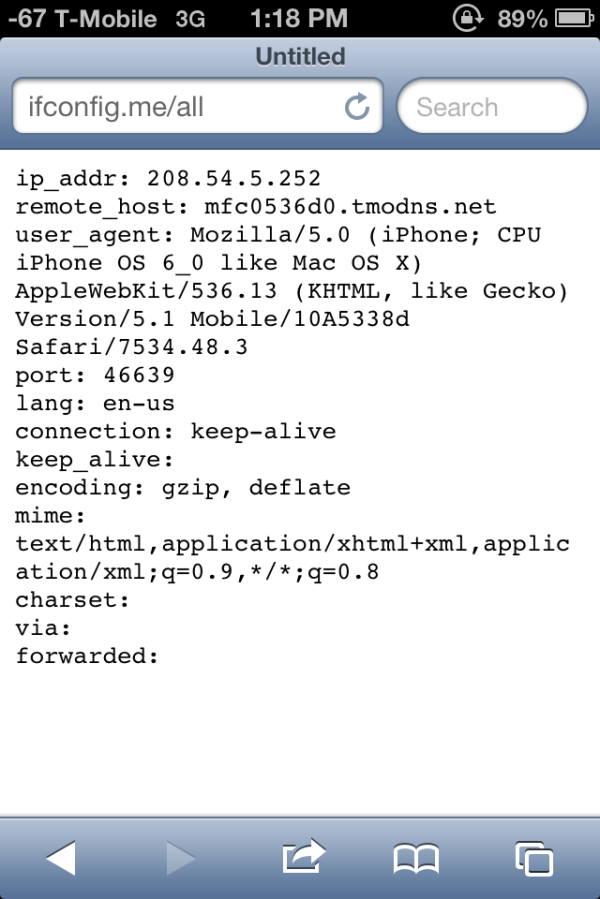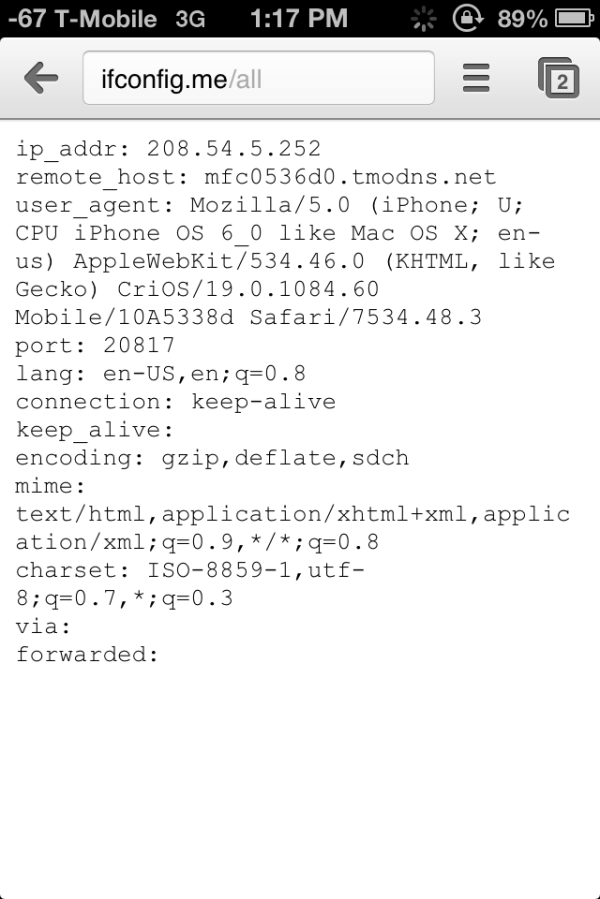Some Impressions and Benchmarks from Chrome on iOS
by Brian Klug on June 28, 2012 4:13 PM EST- Posted in
- Smartphones
- Mobile
- Chrome
- iOS
- Tablets
- Trade Shows
- I/O 2012
Earlier today, Google announced Chrome for iOS (iPhone and iPad), and thanks to Richard Gaywood finding a direct link to the App Store, I got the chance to play around with it in-between a busy schedule of sessions and meetings at I/O 2012. Chrome on iOS weighs in at 12.8 MB and is version 19.0.1084.60.
Earlier I had a glimmer of hope that Apple had relaxed the App Store rules to allow Chrome as a real native application on iOS, complete with its V8 JavaScript engine and newer version of WebKit (535.19). Unfortunately, as suspected, Chrome on iOS uses iOS' UIWebView, which means the same rendering engine as mobilesafari. On my iPhone 4S running iOS 6 B2, you can see the same user agent string (with the Chrome OS version tacked in between some other things) shared between mobilesafari and Chrome.
| iOS MobileSafari | |||||||
| Location | WebKit Version | HTML5test.com Score | CSS3test.com Score | Sunspider 0.9.1 | |||
| iOS 5.1.1 | 534.46 | 324 + 9 | 52% | 2226.1 | |||
| iOS 6.0 B1 | 534.46 | 360 + 9 | 57% | 1842.9 | |||
| Chrome for iOS (on iOS6 B2) | 534.46 | 360 + 9 | 57% | 6839.4 | |||
In addition, like other apps leveraging UIWebView, there's no access to mobilesafari's Nitro JavaScript engine which has JIT and other optimizations that make it run much faster. That means JavaScript execution is significantly slower inside Chrome on iOS than it is in mobilesafari.
On the positive side, the Chrome interface is pretty much exactly how it appears on Android, including the nice tabbed card switcher complete with the ability to close and switch tabs by swiping off the edge of the screen. Scrolling around inside webpages is also nice and speedy on Chrome for iOS, which isn't a surprise since, again, it's using UIWebView. The real feature in Chrome for iOS sadly isn't a superior browsing engine, but rather the ability to sync your tabs, pages, and back history across the desktop and more mobile platforms.
Update: As NobleKain points out in the comments, there's a discrepancy between WebKit versions between iOS 6 B1 and B2. B2 is now running 536.13, but WebView remains 534.46. Either way for users running iOS 5.1.1, these should be the same, I just unfortunately only have a device on me running the beta, hence the discrepancy.


















52 Comments
View All Comments
NobleKain - Thursday, June 28, 2012 - link
Brian, correct me if I'm wrong, but don't your Safari (iOS6 B2) and Chrome versions have DIFFERENT webkit versions?Look at your screenies:
Safari: AppleWebKit / 536.13
Chrome: AppleWebKit / 534.46.0
Brian Klug - Thursday, June 28, 2012 - link
Good catch, I compared the Chrome output to what I had in my table. Apparently iOS 6 B2 has changed the core webkit version to be newer once more than Chrome. Interesting.-Brian
DanielPox - Thursday, June 28, 2012 - link
Hey, apparently Chrome has updated since I get the score 379 at html5test.com. I'm running iOS 6 B2 and just got Chrome. :)faizoff - Thursday, June 28, 2012 - link
The Chrome app is miles ahead of the default Safari browser. I love it already.Super56K - Friday, June 29, 2012 - link
I must be doing something wrong. I got the app, synced with my Google account, and spent 60 seconds cursing at how choppy it was compared to Safari before giving up.faizoff - Friday, June 29, 2012 - link
Dunno man, webpages are loading much faster for me on chrome than safari. It's almost like desktop browsing. I was really surprised by how snappy it was. I wasn't expecting much difference so it's a surprise to me as well.phoenix_rizzen - Sunday, July 1, 2012 - link
HTML rendering may be faster, but JavaScript performance will be *way* slower.Mobile Safari has access to the Nitro JavaScript JIT.
Chrome on iOS does not have access to Nitro, and does not include V8, meaning it's manual, slow, non-JIT interpretation of all JavaScript, one slow instruction at a time.
faizoff - Thursday, June 28, 2012 - link
Now all that remains on Chrome is to get Ad Block and I'll be extremely happy.duffman55 - Friday, June 29, 2012 - link
I'd be interested in seeing some page load times for a variety of websites. I'm curious to see how having a slower Javascript engine affects performance. It seems pretty quick to me. Possibly quicker than Safari, somehow.So far I'm quite impressed with Chrome on iOS. This is the first time I'm considering completely replacing Safari with a third party browser. Right now I only use Dolphin for when I want to view pages in desktop mode. I couldn't get the desktop mode in Chrome to work on Engadget, I had to scroll to the bottom and choose desktop view. But It worked on every other site I tried.
P.S. The tab close animation is fun to play with.
Wolfpup - Friday, June 29, 2012 - link
I'm more interested in how the iPhone in the picture appears to be using 3G T-Mobile! I thought you could use an unlocked iPhone on T-Mobile, but it was stuck using GSM/Edge, and you still had to manually enter some settings to work, and don't get visual voicemail, etc.Is that not the case? Does T-Mobile work more smoothly with the iPhone now?
Regarding Chrome-I'm installing it, but remain incredibly disappointed that Apple doesn't allow 3rd party browsers. HUGE advantage Android has there.
The one thing keeping me with Apple is the awesome podcast support, only they seem to be destroying that with their HORRIFIC "podcasts" program they released a few days ago...like rumors have it iOS 6 will ONLY support that, which will quite possibly leave me with no reason to use iOS over Android or Windows Phone 8.